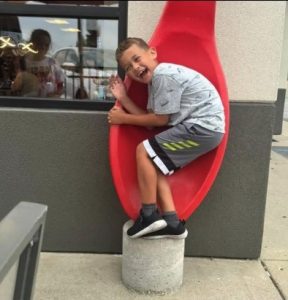When 8-year-old Liam Dahlberg came home from school with a headache, his mother, Ashlee, thought it was nothing serious. But by the next morning, her worst nightmare became reality.
Liam was barely responsive. His family rushed him to the hospital, where doctors made a terrifying discovery: invasive bacteria had attacked his brain and spinal cord. Despite every effort, it was too late.
Liam had contracted Haemophilus influenzae type b (Hib)—a rare but aggressive bacterial infection that can cause life-threatening complications like meningitis and sepsis. Though he was fully vaccinated, doctors suspect Liam was exposed to the bacteria through an unvaccinated classmate, a growing risk as childhood vaccination rates continue to decline in the U.S.

A Devastating Diagnosis
At the hospital, doctors performed an MRI and found that Hib had rapidly spread throughout Liam’s brain and spinal cord. The infection had become deadly meningitis in just hours.
“There was nothing they could do,” Ashlee told WHTR. “Anybody that contracts it usually dies within 24 hours.”
She held her son’s hand and stayed by his side as he was taken off life support.

“To lay there with him and feel his little heartbeat fade away… I would never wish this pain on my worst enemy,” she said. “To hear the doctor say, ‘You did everything right,’ but still lose him—it breaks you.”
A Mother’s Plea: Vaccinate Your Children
Now, Ashlee is speaking out in hopes of saving other families from the pain she carries every day.
“I feel I failed my child because I couldn’t protect him from everything that could hurt him,” she said. “But I want other parents to hear this: please vaccinate your children. Don’t take this risk.”
According to Dr. Eric Yancy, a pediatrician, Hib was once a leading cause of childhood deaths before the vaccine became widely available in 1985. “It was absolutely devastating,” he said. “If it didn’t kill a child quickly, it often caused long-term disabilities.”
While the Hib vaccine is about 95% effective, it only protects those who receive it. That’s what makes herd immunity so vital—unvaccinated individuals can still carry and spread the bacteria.
Remembering Liam
Liam’s family remembers him as a bright, loving boy who brought joy to everyone around him.
A GoFundMe campaign describes him as “smart, full of potential, kind and sweet—his presence lit up every room.” The fundraiser has raised over $54,000 to help with the family’s medical expenses and funeral costs.

Ashlee also shared a heartbreaking video of Liam in the hospital, his small body overcome by the infection. “He was suffering so much, and we couldn’t save him.”
A Growing Global Concern
The World Health Organization recommends the use of a pentavalent vaccine that protects against five serious illnesses, including Hib. But access and cost remain major challenges, particularly in less developed countries.
By 2023, 92% of people in high-income countries were vaccinated against Hib, compared to just 77% globally. In some regions, like the Western Pacific, rates are as low as 33%. One key issue: Hib vaccines cost up to seven times more than the combined vaccines for measles, polio, diphtheria, and tetanus.

As vaccine hesitancy rises and coverage rates decline in the U.S., Liam’s story is a tragic reminder of what’s at stake.
Ashlee’s message to other parents is clear and urgent:
“This didn’t have to happen. Please, vaccinate your kids. I don’t want any other parent to go through this pain.”





